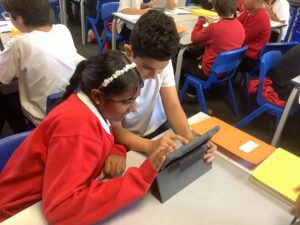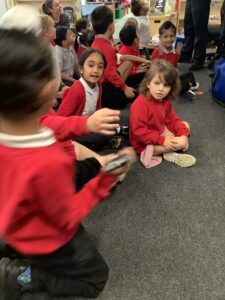Autumn1: Week7
This week we have been reading the book Henri’s Scissors.
The children have been inspired by this story and created mater pieces of their own.






Maths
During maths, we have been continuing our work on subitising. This is where the children don’t need to count the amount of objects, they just know. We do this a lot without thinking for instance, when we read the amount on dice.
Help at home by playing board games with your child. When they are moving their counter, ensure they are counting accurately.
Phonics
The children have learnt lots of new sounds this half term.
Help at home by practicing these regularly to support your child with their reading journey.
We have started challenges in our areas of provision this week. These are focus tasks for the children to complete each week. The children have enjoyed completing them both independently and with adult support.




Junior Leadership
Next week the children will have the opportunity to put themselves forward to be a member of our Junior Leadership team. There will be two children selected from each class. Their role is to be the voice of the class and share our ideas with peers and adults. Please discuss this with your child and support them if they wish to put themselves forward for this.
We have been talking to the children about democracy and that everyone in our class has the right to their say. The children will be voting using a ballet paper and we will go with the majority votes.
Poetry Picnic
We have really enjoyed performing our poem this week.
Reminders
Thursday is class voting day.
Please ensure children have no earrings in for PE on a Friday.
Please write a comment in your child’s reading record and bring to school on a Thursday.
Please send in any pictures of things that your children have done over the weekend. We enjoy sharing these with the class.
11 October 2024
- through
- kind
- wild
- paper
- later
- music
- human
- friend
The children will be tested on these words next Friday 18th October.
Please encourage your child to try practise the words by putting their words in a sentence using our handwriting guide. Also, look at the spelling activities guide for some ideas to practise these words.
Lotherton Hall Trip!
Today, Year 3 went on their school trip to Lotherton Hall. Lotherton Hall is full of animals and history which is perfect for our Science and History learning at the moment!
The focus today was Science – animals including humans. We discussed five ways we can group animals based on their characteristics:
- mammals
- reptiles
- birds
- fish
- amphibians
We looked at x-rays and replica skulls and classified them based on what we could see. For example, some animals had a backbone and others didn’t or some had wings and others didn’t.
We explored the Wildlife World and the playgrounds (of course!) The weather was great too so we were outside for most of the time. Take a look at us exploring…













Help at home by grouping animals based on their characteristics. What do penguins and flamingos have in common?
Why not take a trip to Lotherton Hall yourselves? There are some Halloween activities on this month until early November. https://museumsandgalleries.leeds.gov.uk/lotherton/
Topic – The Golden Age of Ancient Greece!
Year 3 are well into their Topic for this half term – Ancient Greece.
Ancient Greece’s Golden Age (the time where it was at its best) lasted from around 800BC to 300BC. During this time, they were a very innovative civilisation. They’ve influenced our lives in so many ways and we made some posters to display this!
Sport
They founded the Olympics with many of the sports we still play today e.g. javelin, discus and horse racing.
The story of Marathon who ran the distance (42 km) which we still run now.
Language
Some of our language originates from Ancient Greek.
Art
The Ancient Greeks loved art and performance. From amphitheaters and amazing architecture to spending time making and decorating pottery, the Greeks did it all.
Philosophy and Writing
We have learnt a great deal from philosophers like Socrates and Plato. So much so, that we still think deeply about the world around us every Friday morning in Year 3.
But every good thing must come to an end! The Golden Age of Greece ended around 300BC due to a few reasons:
- City states like Athens and Sparta were warring over land, resources and power.
- The Romans were attacking and trying to invade to expand their empire.
- Greek oligarchies were being over thrown by the poorer communities as they felt they weren’t being listened to!
We created some freeze frames to match these scenarios in our lesson this week.
Help at home by exploring other ways that Ancient Greece has influenced our lives today! What else can you find?
Maths: multiples
Today, we investigated multiples and common multiples.
By working logically and systematically, we found the multiples of one number, eg 4, the multiples of another number, eg 3, and found the numbers in both lists, eg 12, 24 and 36.


Some of our learning involved adding numbers to Venn or Carroll diagrams and explaining our reasoning.



We had to work well as a team!

Help at home by recapping key terminology such as factor, multiple, prime and composite.
Scooter Training!
Today, Year 3 have been scooter training! Using a scooter to travel, rather than driving in a car or on a bus, is much more active and clean. It’s good for us and the environment.
First, we reminded ourselves of the Green Cross Code:
- THINK
- STOP
- LOOK
- LISTEN
We then practised using this code outside while scootering around. We had some fun practising our stopping using our break.
Then we stopped and walked while crossing a ‘road’ and looked behind us while crossing a ‘driveway’.
Help at home by choosing an active way to travel. When crossing a road or driveway can you use the Green Cross Code to keep you safe?
Summarising
This week’s reading focus has been summarising.
We’ve looked at some history-based texts about the Stone, Bronze and Iron Age.


We worked as a team to digest the important information and formulate it into our own words.



Living and Learning: 8Rs
This week, Y6 discussed each of the 8Rs and how they help us to learn.
We also had an honest reflection about our strengths and areas of improvement.
“I think I need to be more resilient at times,” share one person.
“I’m great at being ready at the start of lessons but sometimes I forget towards the end,” explained another.
I really appreciated this mature honesty. It was nice to celebrate the strengths, too.
“I have a great memory so I’m good at remembering things,” beamed a different Y6.
Another shared, “I am nervous about risks but really good with taking safe ones.”

Help at home by having a look at the picture above and spotting which two Rs need to swap places!
Summer 2: Week 6 Safety Week
This week has been learning all about safety.
The children have been learning all about staying safe online, people who help us and staying safe around animals.
We have been lucky enough to have lots of visitors this week too.
During the week, we had a visit from two of our local police officers. They we able to help us identify who we need to speak to if an adult asks us for help. They also showed us some of the special equipment they use in order to keep themselves safe.



A person from our local dog’s trust came to talk to us about being safe around dogs. They taught us the five rules to stay safe around them.



We were also lucky enough to be taught some martial arts this week too.

Maths
During maths this week, we have been looking at time. We have been identifying why we need to tell the time and what different things we can use to tell it. The children have enjoyed timing eachother to do different activities.
Reminder
Please can all children bring a bag in on Thursday 18th July so that they can take their school books home.
Safety Week!
This week is a themed week all about staying safe in lots of different areas of life. We’ve had learning based around safety at home and visitors in talking about safety around water, online, animals and on the road.
Have a look at what we’ve been up to in Year 3:
Water Safety
Rivers and Canals Trust and RNLI spoke to us about safety around different types of water. We must if we or someone else is in trouble:
- Call for help
- Do not climb in the water
- Stay calm
- Float like a starfish
The police discussed hate crime – any crime committed against someone because of race, gender, relationships, disability and/or religion. This includes the words we use! We must treat others how we wish to be treated.
This is the same while we’re online too. Our digital footprints are something we need to think about as these could affect us years later. Not everything that we see online is or true fact so we must be critical users and tell a trusted adult if you’re unsure or you feel unsafe!
Safety at Home
Home should be a safe and comfortable place to be but there are things that can be risky or unsafe. We identified things that could be unsafe and how we can make good choices around them! For example:
The kitchen has things that can be hot (ovens, kettles) or sharp (knives) but when we’re with a trusted adult, they can help us stay safe when we’re helping cook.
We then had visitors in to talk to us about different bacteria (the good and the bad). We saw how bacteria transfers from one thing to another and how to wash our hands thoroughly. Help at home: Sing happy birthday twice while washing your hands!
First Aid
First aid training is super important for the children as they can use this process if something were to happen to someone they are with.
1. Check if they are awake.
2. Call for help!
3. Check if they’re breathing.
4. Call 999.
5. Do CPR – 30 chest press and 2 breaths.
Road Safety
Road safety is essential whether you are walking, cycling or in a moving vehicle! There are many things we can do to keep us and others around us safe.
- Wear a helmet when cycling or scootering.
- Wear a seatbelt if there is one available.
- Stay seated if on the bus.
- Don’t distract someone who is driving.
Travelling somewhere by being active is a great option. Not only is it better for us, mentally and physically but it’s better for the environment too!
We also had a go at checking speed limits which was harder than it seems. We had to read the speedometer, remember the number plates and note it all down as well.
Animal Safety
Dogs Trust spoke to the children about how to approach and treat dogs because not all dogs can be friendly. They have emotions and feelings like us but they can’t express them like we can. If a dog approaches us we should:
1. Keep our arms crossed.
2. Don’t make eye contact with it.
3. Let it sniff you to get to know you.
4. Ask the owner if you can stroke or touch the dog.
Following these instructions will keep you and the dog safe!


















